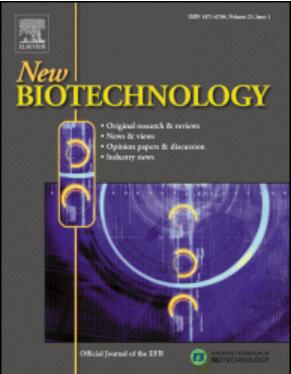解决生物技术中的语义歧义:来自欧洲研究基础设施IBISBA的建议
IF 4.9
2区 生物学
Q1 BIOCHEMICAL RESEARCH METHODS
引用次数: 0
摘要
在上世纪下半叶生物学领域的众多科学发现的推动下,生物技术现在将在推动先进制造业方面发挥重要作用,利用生物体的力量生产一系列商品和服务。考虑到这一前景,至关重要的是,围绕生物技术的术语必须足够清楚,以便为有效的管理和公众的支持提供基础。尽管生物技术这个术语看起来很清晰,但它的定义是一个长期争论和自由解释的主题。同样,其他较新的术语,如生物制造、合成生物学和工程生物学,尽管在科学界和世俗界都有使用,但也缺乏共识的定义。此外,最近在企业对企业交流框架中引入的新术语,如精确发酵和细胞农业,似乎需要想象而不是科学事实。在此,我们研究了生物技术领域的词汇复杂性,并认为,为了有效的决策,协调一些核心术语的定义是至关重要的,包括生物技术、生物制造、工程生物学和合成生物学。考虑到这一目标,本讨论文件旨在对决策者和科学传播者有用,无论是在媒体还是在专业环境中。本文章由计算机程序翻译,如有差异,请以英文原文为准。
Addressing semantic ambiguity in biotechnology: Proposals from the European research infrastructure IBISBA
Driven by numerous scientific discoveries in biology in the second half of the last century, biotechnology is now set to play an important role as a driver for advanced manufacturing, leveraging the power of living organisms to produce a range of goods and services. Considering this prospect, it is vital that terminology surrounding biotechnology is sufficiently clear to provide a basis for efficient regulation and public buy-in. Despite the apparent clarity of the term biotechnology, its definition is the subject of a longstanding debate and liberal interpretations. Likewise, other more recent terms such as biomanufacturing, synthetic biology and engineering biology also lack consensual definitions despite their use in both scientific and secular circles. Additionally, new terms such as precision fermentation and cellular agriculture, recently introduced in the framework of business-to-business exchanges, appear to call upon imaginaries rather than scientific facts. Herein, we examine the lexical complexity of the biotechnology field and argue that, for the sake of efficient policymaking, it is vital to harmonise the definitions of some core terms, including biotechnology, biomanufacturing, engineering biology and synthetic biology. With this aim in mind, this discussion paper is intended to be useful to policymakers and science communicators, whether in the media or in professional settings.
求助全文
通过发布文献求助,成功后即可免费获取论文全文。
去求助
来源期刊

New biotechnology
生物-生化研究方法
CiteScore
11.40
自引率
1.90%
发文量
77
审稿时长
1 months
期刊介绍:
New Biotechnology is the official journal of the European Federation of Biotechnology (EFB) and is published bimonthly. It covers both the science of biotechnology and its surrounding political, business and financial milieu. The journal publishes peer-reviewed basic research papers, authoritative reviews, feature articles and opinions in all areas of biotechnology. It reflects the full diversity of current biotechnology science, particularly those advances in research and practice that open opportunities for exploitation of knowledge, commercially or otherwise, together with news, discussion and comment on broader issues of general interest and concern. The outlook is fully international.
The scope of the journal includes the research, industrial and commercial aspects of biotechnology, in areas such as: Healthcare and Pharmaceuticals; Food and Agriculture; Biofuels; Genetic Engineering and Molecular Biology; Genomics and Synthetic Biology; Nanotechnology; Environment and Biodiversity; Biocatalysis; Bioremediation; Process engineering.
 求助内容:
求助内容: 应助结果提醒方式:
应助结果提醒方式:


